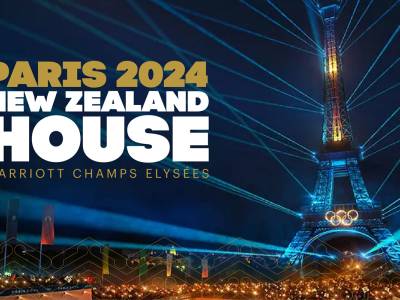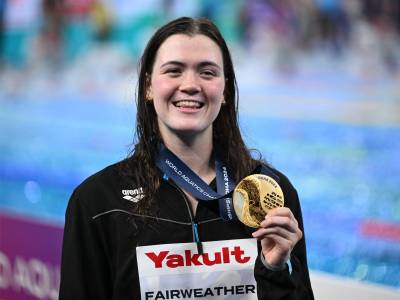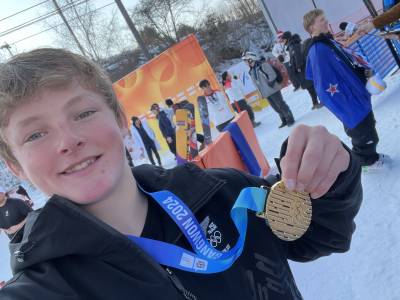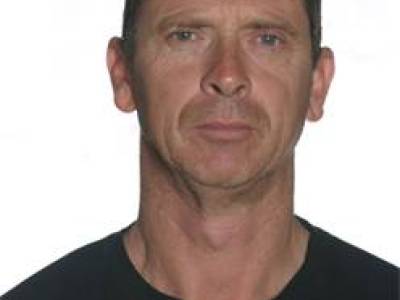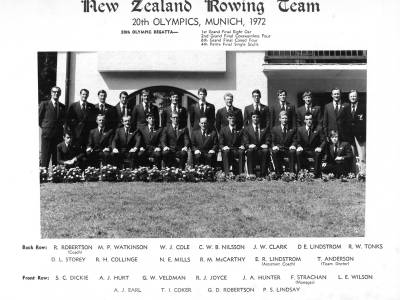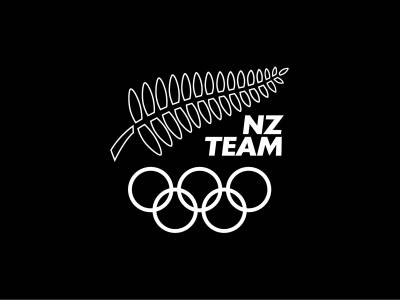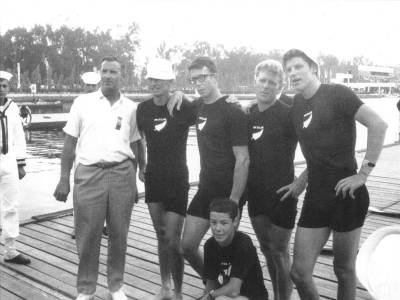Simon Dickie
Born 1951
With his youthful, cherubic looks, Dickie's is the most recognisable face of the champion rowers of the late 1960s and early 1970s.
He was fresh out of Wanganui Collegiate when he was drafted into the national rowing squad by coach Rusty Robertson, as a replacement for No 1 cox Alan Boykett, who had drowned in an accident on Wellington Harbour.
Unlike the rowers in the coxed four – who had been hoping initially to make the prestigious New Zealand eight crew - Dickie was elated just to get to the Mexico City Olympics. He went as the back-up cox, but improved quickly and was rewarded with a gold medal in the coxed four.
After a few weeks in camp at Kerrs Reach, Christchurch, the four had realised they had a special chemistry. In Robertson's words: “When they got together, they were they funniest-looking crew you'd ever seen.”
This dark horse status was to work to their advantage.
The eight, so impressive in the build-up to the Olympics and in the early rounds, crumbled late in the final and came fourth. The New Zealand oarsmen finished in a state of distress, mainly because of the thinner altitude at Mexico City.
However the four – stroke Dick Joyce, Dudley Storey, Ross Collinge and Warren Cole, plus cox Dickie - never put a foot wrong, winning their heat and semi-final, though not in the fastest times.
In the final they pushed their bow ahead at 300 metres and continued to attack, winning by nearly three seconds from East Germany and Switzerland. That was the last time they raced together – three races, three victories, and the gold medal.
Dickie went on to become one of the senior figures of the rowing group and a key liaison figure between Robertson and the rowers.
He was in the eight that finished third at the 1970 world championship at St Catharines, Canada, after earlier winning the United States national championship at Camden, Philadelphia.
In 1971 Dickie coxed a revamped eight to victories in international races at Duisburg, Germany, and Klagenfurt, Austria. When the eight beat the feared East Germans to win the European title at Copenhagen, they were awarded the International Olympic Committee's Taher Pacha Trophy for excellence in amateur sport.
Dickie did an outstanding job as cox of the eight-oar crew that won the gold medal at Munich so dramatically.
The New Zealand eight were among the favourites at those Olympics and duly delivered.
Robertson prepared them well, and they responded by outclassing a quality field to win by nearly three seconds, from the Americans and East Germans. This was a significant victory for the “amateur” New Zealanders over the “professional” northern hemisphere crews, and, significantly, the medals were presented by IOC chief Avery Brundage.
New Zealand's rowing stocks were never higher than that emotional day at Feldmoching when the eight – Tony Hurt, Wybo Weldman, Dick Joyce, John Hunter, Lindsay Wilson, Athol Earl, Trevor Coker, Gary Robertson and Dickie – stood on the dais, gold medals around their necks, listening to God Defend New Zealand while they shed tears of joy.
Dickie retired from rowing soon after, but was induced to return for a crack at the 1976 Olympics at Montreal. Though the eight there was not the smooth machine of years previously, Dickie still added a bronze medal to his Olympic collection.
Outside the Olympic arena, Dickie had many other successes, including an eights bronze medal at the 1970 world championships at St Catharines, Canada, and an eights gold medal at the 1971 European championships at Copenhagen.
Dickie won two national titles, with the Wellington eight in 1970 and the Wellington four in 1972.
Since the 1960s, Dickie, now based in Taupo, has been involved in adventure tourism. He formed his own company, Simon Dickie Adventures, in 1972. Initially the company was based around fishing, but more recently it has moved much more to shooting (birds).
Dickie leads groups from New Zealand to Australia and also from the United States to England and from Australia to South America.
Dickie's wife Susanna died in 1996. They had three daughters.
The 1968 coxed four and 1972 eight that Dickie coxed to Olympic golds were inducted into the New Zealand Sports Hall of Fame in 1990. The eight that won the world title in 1971 and the Olympic gold in 1972 won the New Zealand Sportsman of the Year award in consecutive years.
Tweet Share
Simon's Games History
-
Olympic Summer Games Montreal 1976
- 3
-
Olympic Summer Games Munich 1972
- 1
-
Olympic Summer Games Mexico City 1968
- 1

